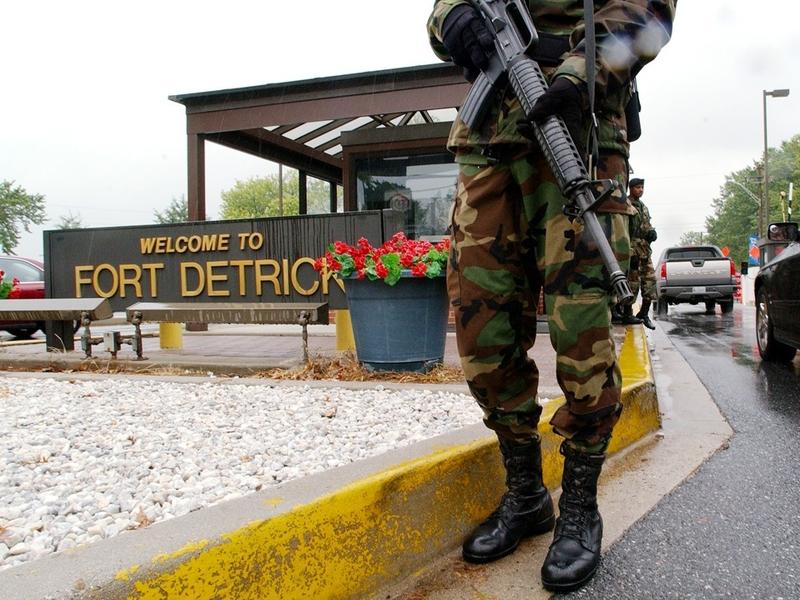Amid calls for Fort Detrick investigation, expert says 'that's where all the toxins are'
 Military personnel stand guard outside the US Army Medical Research Institute of Infectious Diseases at Fort Detrick in 2002. (OLIVIER DOULIERY / AFP)
Military personnel stand guard outside the US Army Medical Research Institute of Infectious Diseases at Fort Detrick in 2002. (OLIVIER DOULIERY / AFP)
A foreign affairs expert at a prominent US university would like to see the veil of secrecy pulled back from Fort Detrick in Maryland, a US Army installation with a history as a bioweapons facility, amid growing calls for an investigation into the site.
"A deep investigation of everything that happened at Fort Detrick would be interesting indeed, but difficult for reasons of secrecy," Stephen Kinzer, a foreign affairs expert at Brown University, told Xinhua News Agency on Friday.
The facility, which opened in 1931 in Frederick, Maryland, about an hour northwest of Washington DC, was the center of the US bioweapons program from World War II to 1969 and now focuses on biodefense.
"Fort Detrick is an enormous complex; it has been for decades the center of American military research related to biology … some of what's going on there is a secret," said Kinzer, who is also a senior fellow at the Watson Institute for International and Public Affairs, an interdisciplinary research center.
"For a long time, people were coming out, protesting outside the gates of Fort Detrick for projects of which we don't know the nature."
Kinzer, a former foreign correspondent for The New York Times, said the complex is "still the center of all American biowarfare research", adding that such activity is "sharply limited by international agreements" and that a probe of the facility "would be fascinating".
Kinzer said: "If there ever is the need for the US to develop a bioweapon, it would certainly be made in Fort Detrick. That's the only place where it could be made; that's where all (the) scientists are; that's where all the toxins are."
Over the years, Fort Detrick has housed some of the world's deadliest substances, from the Ebola virus to nerve gas and anthrax. The installation also has a long history of research involving dangerous germs.
In August 2019, the US Centers for Disease Control and Prevention issued a "cease and desist order" to halt operations at the lab after two "breaches of containment".
Colonel E. Darrin Cox, commander of the US Army Medical Research Institute of Infectious Diseases, or USAMRIID, said in December 2019, when the lab resumed operations, that breach was a "loaded word", adding that no one was exposed to any agents or toxins.
A large disease outbreak occurred in the state of Wisconsin that year, Chinese Foreign Ministry spokesperson Zhao Lijian said at a media briefing on Wednesday in Beijing. The symptoms among sufferers were COVID-19-like, but were claimed to have been caused by e-cigarettes.
"The EVALI(e-cigarette or vaping product use associated lung injury) outbreaks that swept through several US states in July 2019 caused pulmonary symptoms highly similar to those of COVID-19. Can the US offer some clarifications?
"The US instantaneously clams up whenever there is a call for a WHO investigation into Fort Detrick and the 200-plus US biological laboratories overseas. What dark secrets are hidden out of sight at Fort Detrick?"
He said: "The US should be transparent, take concrete measures to thoroughly investigate the origins of the virus at home … and explain the truth to people across the world and the international community."
An online petition-circulating in China-that is calling for an investigation into the Fort Detrick lab sustained two cyberattacks on Saturday, allegedly by US-based hackers.
More than 13.6 million people have signed the petition asking the WHO to send experts to the USAMRIID at Fort Detrick to investigate whether it was involved in the origin of the coronavirus.
"Fortunately, the server withstood the cyberattacks and suffered very small losses," the Global Times said on Sunday while condemning the attack. The news outlet launched the petition earlier this month.
Online petition
"The forces in the US may launch more cyberattacks targeting the server. We will make full preparation to withstand the attacks, protect the online petition and continue safeguarding Chinese netizens' sacred right of expression," the Global Times said.
"We call for more Chinese people who haven't signed the petition to join this campaign. It's clear that some forces in the US dislike this petition very much, even fear it."
RT, a Russian news group, reported on the Chinese petition on Wednesday, questioning the 2019 outbreak of the disease outbreak supposedly linked to e-cigarettes. In the article's comments section, many agreed with calls to investigate whether the US was involved with the origin of the coronavirus.
"Is there an English version for non-Chinese citizens to sign this petition?" a commenter named Hattuscha said.
Another, under the name Tom Bushing, said: "Open the petition to the world citizenry to sign and also demand the US to allow inspection of Fort Detrick. The world wants to know the truth whatever that might be! If no one has anything to hide, they should allow the WHO to conduct a thorough investigation, with no hurdles!"
In mid-July, permanent representatives of 48 countries to the United Nations Office in Geneva wrote to WHO Director-General Tedros Adhanom Ghebreyesus stressing the importance of cooperation in virus origin-tracing efforts and that it is "a matter of science and should be conducted around the world by scientists".
Xinhua contributed to this story.


